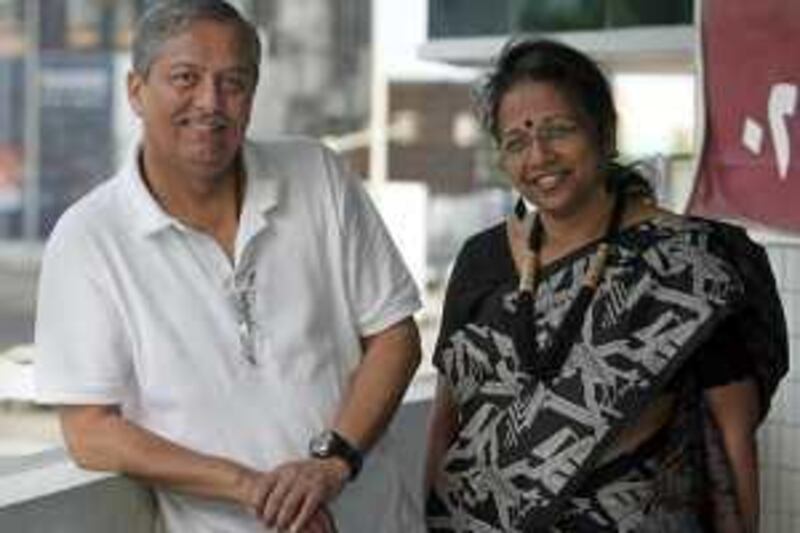ABU DHABI // Cloistered in air conditioned apartment blocks and raised on video games and mall crawls, some pupils at the Abu Dhabi Indian School grew up insulated from the natural beauty of the desert around them.
Many did not know about the flowers that bloomed after the rains, the bugs or the names of the birds that surrounded their school. Many thought the sand dunes and scrub were dead landscapes meant only for dune-bashing. But the school's Nature Club has been trying to change all that by raising awareness about waste, pollution and how to live in harmony with nature. The club, called Prakriti, a Sanskrit word for nature, was started in 1992 and has become one of the capital's pioneering school-based environmental organisations.
Its growth has paralleled the country's environmental awakening in recent years. As residents become more aware of the UAE's huge carbon footprint, they have begun to take notice of the desert and its wildlife. They have become more conscious of water consumption and the country's reliance on desalination, a costly process that releases tonnes of carbon dioxide. The Nature Club tries to raise awareness of these issues, as well as the high levels of waste and lack of recycling in the UAE. Club members have even held a fashion show with outfits created from refuse.
The club was started after the school won first place in an environmental essay contest held by Shell, the oil company. Karan Raghwa and his wife, both with backgrounds in geography, decided to start a nature club to educate the children about the environment. More than 17 years later, the club is thriving, and encourages the school's 5,000 pupils to take part in fairs, field trips and clean-up drives.
It was not until the late 1990s that other schools began to follow suit, said Mr Raghwa, who has been in Abu Dhabi for more than 20 years. "The positive side of it is that schools are now starting to add environmental education into their curriculum," said Mr Raghwa, a supervisor for the boys section. Schools are also conducting green audits, he said, and pupils are studying how much water and energy their institutions are using.
The club members especially enjoy the regular field trips to the desert, he said. There, they learn about the flora and fauna of the country's varied ecosystems. One trip included an overnight camping trip near Sweihan where pupils learnt how to trap desert rodents like gerbils and hedgehogs. "The students really like that," he said. "One of my student's fathers booked a desert safari and he refused to go," Mr Raghwa said.
"He said, 'You're driving with 4x4s on sand dunes, but you don't know how many plants and animals you are killing.'" This type of club was unheard of when it was established 17 years ago, said Kala Krishnan, an English teacher and the club's co-ordinator. Then, there was virtually no environmental awareness. Things began to change a few years ago when residents became aware of the UAE's high per capita carbon footprint and water consumption.
To demonstrate the amount of water used in the UAE, the children piled 367 one-litre Masafi water bottles in a pyramid during a recent fair representing two-thirds of the 550 litres of water each household uses daily. "The parents refused to believe it," Ms Krishnan said. A recent report from the Environment Agency-Abu Dhabi praised the school's nature club and encouraged more schools to adopt its model, Mr Raghwa said.
"As this has to do with the environment, it's difficult to change behaviour," he said. "So kids are the right target." "Here, everything is 24/7, including water and electricity." Ms Krishnan agreed. "When I first came here, water was free," she said. "Then they put a blanket fee of Dh50 on it. Some schools don't even have meters now. "You get wasteful when you don't start to consider how the water comes to you and at what cost."
The club, which has about 20 core members, is making a difference, the co-ordinators said. Several of the school's alumni have started similar clubs in India and as far away as Canada. Also, several graduates have rejected the traditional trio of top Indian jobs engineer, doctor and dentist to pursue careers in environmental science, Ms Krishnan said. Change has been slow, Ms Krishnan added. She was still surprised that the capital has failed to establish a mandatory recycling programme. And, as development progresses, she notices less and less green space. There are fewer birds in the mangroves surrounding the school than there once were.
However, things are improving in some areas. "Now the media coverage is much better," Mr Raghwa said. "And there are more government initiatives." Their last environmental fair drew more than 3,500 parents and pupils and included a stand for Masdar, the carbon neutral city under development outside Abu Dhabi. These successes would have been unthinkable almost two decades ago, Ms Krishnan said. "We have competition now from other schools," she said.
jgerson@thenational.ae





